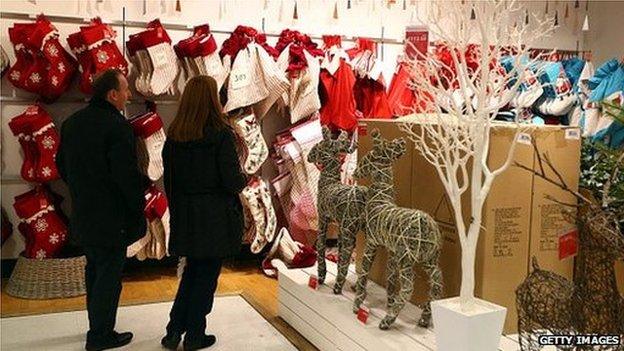John Lewis warning over free deliveries
- Published
- comments

I have just interviewed the head of John Lewis about Christmas sales and he has raised two very important points that go to the heart of retail's online revolution.
First, that the American import Black Friday could have a detrimental effect on how retailers and consumers behave.
And second, that consumers' expectation that online delivery should be no more expensive than buying it in a shop will have to be tackled.
To be sure of delivery, Mr Street says customers are likely to have to pay.
For the actual details on how well John Lewis did over Christmas, you can go here.
Mr Street is clearly uncomfortable about the development of Black Friday, a one-off day when retailers compete with each other to offer the best deals on everything from fridges to winter coats.
It fell on November 28 this year and saw a huge surge in sales as customers grappled in the aisles - often literally - for televisions and computers.
John Lewis managing director Andy Street: "My personal hope is that this is the high water mark for Black Friday"
But sales then fell away, introducing a new volatility into the beleaguered retail market and playing all sorts of havoc with businesses' cash flow.
Sales spike
Consumers may well respond, so what? If I'm getting a good deal, that's the point.
But of course there is no such thing as a free lunch.
If prices are slashed at one date in the year - and in this instance a pretty artificial one as Black Friday is actually a US invention built around Thanksgiving - then they will go up during another period of the year to compensate.
Black Friday also creates a huge spike in sales which this year threatened to bring some operations shuddering to a halt.
Marks & Spencer, for example, had problems at its Castle Donnington distribution centre - even though it's a brand new facility.
Delivery businesses such as Yodel also had difficulty fulfilling deliveries. City Link went bust over Christmas as losses in its online delivery business caught up with it.
Mr Street, although making it clear that John Lewis had no problems with deliveries having spent hundreds of millions of pounds on "back end" systems, told me that he hoped Black Friday would be calmer when it comes around again later this year.
Stoking the fire?
"My personal hope is that this is the high water mark for Black Friday," he told me.
"I don't think we can put the genie back in the bottle - I think absolutely those discounts, particularly those discounts in the electrical sector, are going to be a feature. But do we need to stoke that fire anymore? I personally hope not.
"Maybe there will be the same promotions in key electrical areas, because that's where it started, but it doesn't mean that all the fashion brands and high street retailers [have to] put their own driven promotions into it as well.
"Perhaps more people will be confident of holding their price in the run up to Christmas."
'Rush for growth'
On the issue of paying for deliveries, Mr Street said:
"I think that those who still do want to get the delivery at home, they are going to have to pay a little more as we go forward.
"Because we are in the early stages of this market, in the early stages of any new emerging market, it's a rush for growth. The market will become more sophisticated and there will be an opportunity that if you really want guarantee, you will be asked to pay a little bit for it."
Mr Street is saying in public what many retail leaders are thinking in private - the market will have to rethink how it organises online promotions and deliveries.
Or the threat that the whole system could suffer a major failure - and leave consumers high and dry over Christmas - will only increase.